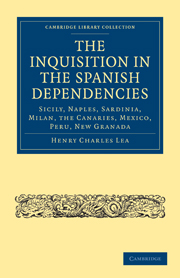 The Inquisition in the Spanish Dependencies
The Inquisition in the Spanish Dependencies The scope of my History of the Spanish Inquisition precluded a detailed investigation into the careers of individual tribunals. Such an investigation, however, is not without interest, especially with respect to the outlying ones, which were subjected to varying influences and reacted in varying ways on the peoples among whom they were established. Moreover, in some cases, this affords us an inside view of inquisitorial life, of the characters of those to whom were confided the awful irresponsible powers of the Holy Office and of the abuse of those powers by officials whom distance removed from the immediate supervision of the central authority, suggesting a capacity for evil even greater than that manifested in the Peninsula.
This is especially the case with the tribunals of the American Colonies, of which, thanks to the unwearied researches of Don José Toribio Medina, of Santiago de Chile, a fairly complete and minute account can be given, based on the confidential correspondence of the local officials with the Supreme Council and the reports of the visitadores or inspectors, who were occasionally sent in the vain expectation of reducing them to order. While thus in the colonial tribunals we see the Inquisition at its worst, as a portion of the governmental system, we can realize how potent was its influence in contributing to the failure of Spanish colonial policy, by preventing orderly and settled administration and by exciting disaffection which the Council of Indies more than once warned the crown would lead to the loss of its transatlantic empire.
To save this book to your Kindle, first ensure [email protected] is added to your Approved Personal Document E-mail List under your Personal Document Settings on the Manage Your Content and Devices page of your Amazon account. Then enter the ‘name’ part of your Kindle email address below. Find out more about saving to your Kindle.
Note you can select to save to either the @free.kindle.com or @kindle.com variations. ‘@free.kindle.com’ emails are free but can only be saved to your device when it is connected to wi-fi. ‘@kindle.com’ emails can be delivered even when you are not connected to wi-fi, but note that service fees apply.
Find out more about the Kindle Personal Document Service.
To save content items to your account, please confirm that you agree to abide by our usage policies. If this is the first time you use this feature, you will be asked to authorise Cambridge Core to connect with your account. Find out more about saving content to Dropbox.
To save content items to your account, please confirm that you agree to abide by our usage policies. If this is the first time you use this feature, you will be asked to authorise Cambridge Core to connect with your account. Find out more about saving content to Google Drive.